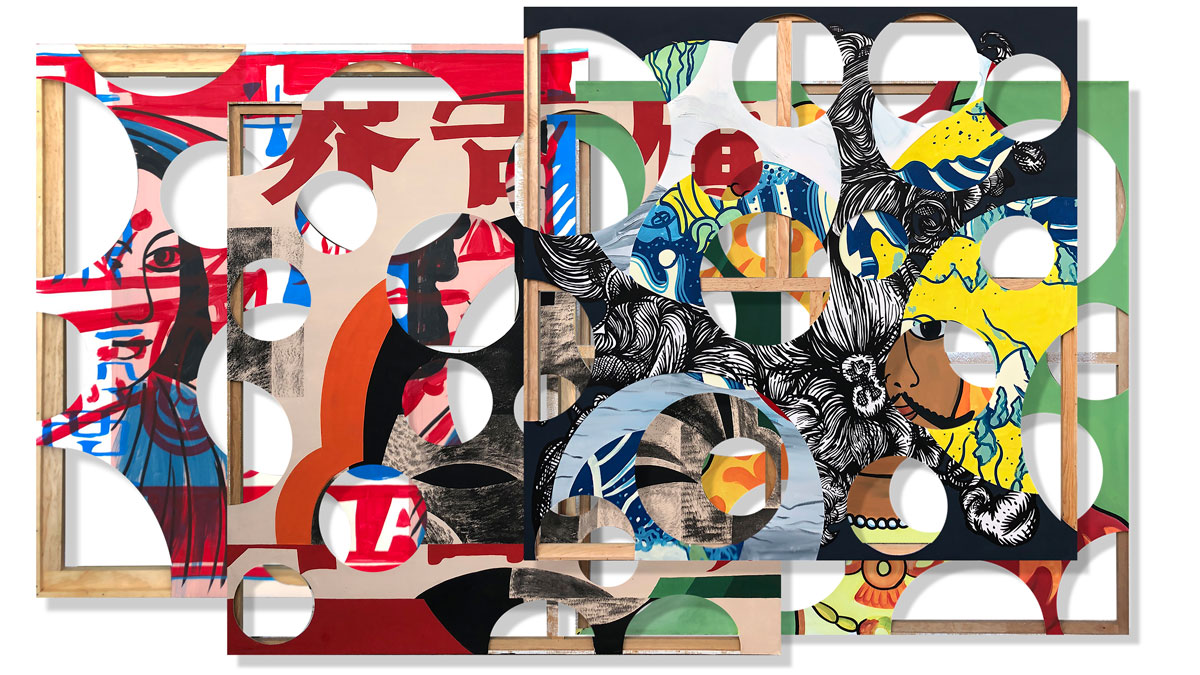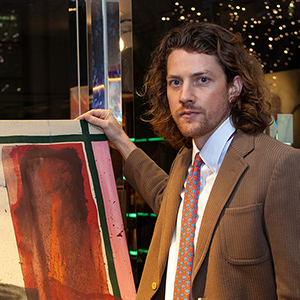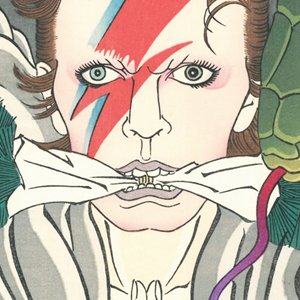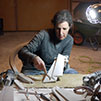A new Tokyo gallery—jointly founded by a British businessman—is providing a revolutionary take on art, leveraging the unique capabilities of the blockchain to bring its vision to life.
Sven Palys, founder and joint-CEO of cultural intelligence and brand consultancy Yuzu Kyodai, set up Strata Gallery earlier this year with four colleagues and the ambition of expanding the possibilities of artistic expression through technology.
The gallery’s first project, by Mexican artist Héctor Falcón, is titled Whole Picture and is designed to bridge physical and digital art through blockchain technology by reimagining his artistic vision in the digital realm, Palys said.
“Hector has been with us right from the start of Strata: he just felt like the perfect artist to work with on our first project”, said Palys, who is also on the executive committee of the British Chamber of Commerce in Japan.
“He is always pushing boundaries, always questioning what art and, in particular, what beauty is, how our society thinks of these things”, he told BCCJ ACUMEN. “He is a fantastic painter, but he is also a film-maker and sculptor; and he has even used his own body as art in really challenging ways. He thrives on installations that get viewers involved in the creative process.
“The art series that Whole Picture is a continuation of—these multi-layered canvases with holes cut out of them—really sum up his constant search to look beyond the superficial”.
Whole Picture is a collaboration between the artist and participants, creating 1,200 unique, multi-layered, interactive artworks to serve as a bridge between digital and physical art.

Sven Palys brings together blockchain, art, Japan, the world and entrepreneurs.
Trusting process
Each piece consists of four digital canvases of varying rarity, with a number of opportunities to lock in the viewer’s preferred images. When complete, the digital works can be manipulated by their owners. Layers can be rearranged, slid in different directions, and even moved automatically so that the larger work is viewed from a perspective that is constantly changing.
The projects evolve as they are revisited by the artist, creating longer-term value and enjoyment from what is a creative journey in which the artworks almost take on a life of their own.
To create the pieces, Falcón cut circles through his own multi-layered canvases to reveal more images lying beneath. He has said that taking the project into the non-fungible token (NFT) sphere seemed “very natural”.
“It is a collaborative artistic experience that challenges some of the dogmas of traditional art by giving birth to a new level of artistic expression”, he said. “In making these pieces, I wanted to combine the world of the artist with the actions of the person who consumes the art, without either of the two being wrong or out of place.
“It is not about buyers making an image that I have to like”, he said. “The idea is that in this digital dimension I can play a sort of game – between my artistic proposal on the one hand and their wishes or preferences on the other.
“What results is a unique artwork, born from a playful and dynamic act”.
Pushing boundaries
As it is the first interactive NFT artwork and sale event in the world, Palys hopes Strata Gallery will challenge “old school” perceptions of digital art being at odds with physical works of art.
“The basic premise is that physical and digital art can interact and elevate each other”, said Palys, 33, who was born in Essex, grew up in Bahrain and read Japanese Studies at the University of Cambridge.
“We don’t really see NFTs as yet fulfilling any promise of democratising art, which is something that is often claimed, that it somehow makes art more accessible”, he said. “Art already is: anyone can buy a print for a few pounds, or view National Gallery treasures online.
“And while there is a real sense of community amongst NFT enthusiasts and innovators, it is a community with high barriers to entry: the technology, the jargon, the need for crypto wallets. These are all hurdles”.
Technology is, however, undeniably beginning to refashion the art market.
“NFT buyers right now mainly think in terms of collectibles rather than art collection, but we are only at the start of what NFTs can be as a medium for artistic expression”, Palys emphasises. “We see our job as producers who can partner and brainstorm with artists on how to take what they already create and take it into the digital realm, not by pixellating it, but by taking it in a different direction, taking it further”.

Japanese inspiration
Palys can trace his own fascination with Japanese culture—both traditional and popular—to a very young age and first came to Japan in the early summer of 2011, shortly after the Tohoku earthquake, on a Ministry of Education, Culture, Sports, Science and Technology scholarship to study media theory at the University of Tokyo.
“I’m a fan of modern art for its purpose of challenging all the norms and conventions that art has stuck to for hundreds of years”, he said. “I love art that challenges expectations and, through that, puts a mirror to our own prejudices. For me, art is at its most powerful when it captures feelings or concepts that words have trouble catching”.
Previous collaborations with a group of like-minded admirers of modern art—Emiliano Liviero and Anna Maxwell at Yuzu Kyodai, as well as Jasper Degens and Barak Chamo—almost inevitably led to the creation of Strata Gallery.
“We think there is an opportunity for an NFT gallery that can demonstrate real integrity in how it helps artists to use this new medium to take their art further, to create art of enduring value and importance”, Palys said. “We want to produce and showcase art that can express beauty and humanity, engage our senses, give us an idiosyncratic view of the world”.
Hector Falcón’s ground-breaking works are being displayed in Proud Gallery in London’s Covent Garden, in the Heart Ego gallery in Mexico City and an artistic “take-over” of the lobby of the Landabout Hotel, a boutique property in Tokyo’s artistic Uguisudani district.
The gallery is particularly keen to expand the collaboration with Intellex, the property development and refurbishment company behind the Landabout Hotel, and whose CEO, Toshinari Seiji, has been a strong supporter of Strata Gallery.
The aim, Palys says, is to further elevate the properties that Intellex has already transformed through its clever and sensitive approach to living spaces with art. Both Strata and Intellex firmly believe that incorporating art into everyday living spaces can only serve as a force for creativity and self-expression.
Palys says he is excited at a project that ties connects blockchain, art, Japan, the world, new modes of living and foreign entrepreneurship in Japan.
“We don’t see NFTs as a declaration of war on traditional, tangible art”, Palys said. “In the right hands, the two mediums can enhance each other, add a different dimension that does what all great arts does; it shows us the world in a different way, through a new lens”.






